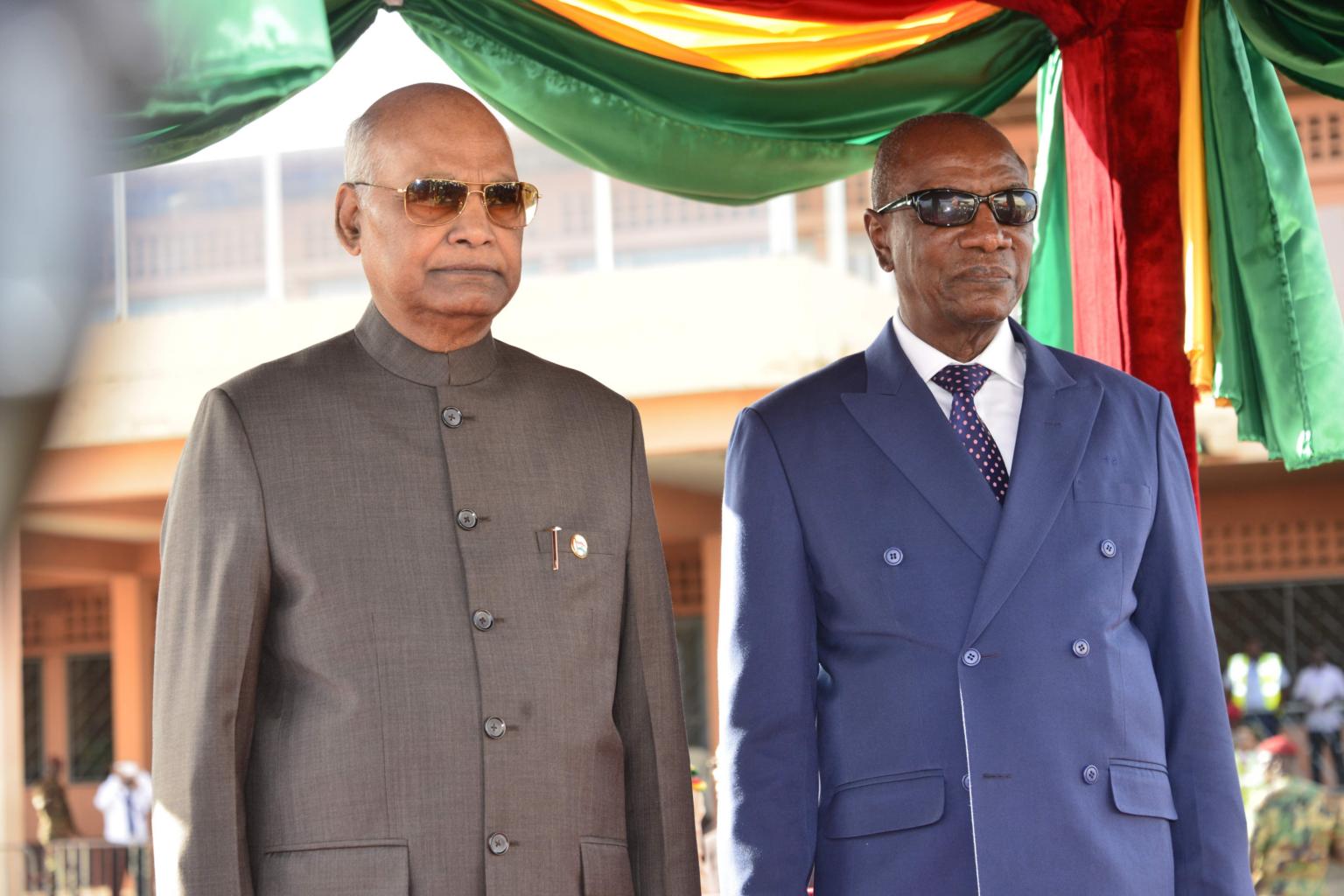Indian President visits west Africa as New Delhi seeks to widen its role in continent
Sign up now: Get insights on Asia's fast-moving developments

Indian President Ramnath Kovind (left) with Guinean President Alpha Conde during a tour of Benin, Gambia and Guinea.
PHOTO: AFP
NEW DELHI - India is strengthening its presence in Africa by stepping up its engagement with hitherto overlooked countries in the western part of the continent.
Indian President Ramnath Kovind is on a tour of three west African countries - Benin, Gambia and Guinea - from July 28 to Aug 3.
This is the first time an Indian president is visiting these countries. The visit comes in the backdrop of an overall push to develop closer strategic ties with Africa, an approach that has been reinforced by greater development assistance, as well as the opening of 18 new missions on the continent from 2018 to 2021.
Mr Kovind's visit covers collaboration in areas such as healthcare, solar energy, skill development, trade and security-related cooperation. Mrs Sunanda Rajendran, the secretary-general of the Indo-African Chamber of Commerce and Industry, told The Straits Times this visit will open up new avenues for India to collaborate with countries in this region, many of which are French-speaking and have been left largely untapped so far.
"The Indian business community in Africa has limited its links mostly to the English-speaking countries (such as Kenya and South Africa). At the same time, we have seen growing interest in recent years from French-speaking countries in collaborating with India," she said. She cited sectors such as agriculture, education, skill development and training, food processing, dairy development, animal husbandry and pisciculture as some of the potential areas of mutual cooperation.
The president's visit also coincides with that of Indian Defence Minister Rajnath Singh who was in Mozambique from July 28 to 30. This was also the first bilateral visit by an Indian defence minister to the country and was aimed at enhancing bilateral defence engagement and maritime cooperation with Mozambique, which has a long Indian Ocean coastline.
India has been concerned with China's growing stronghold on the wider neighbourhood of the Indian Ocean region. While Beijing maintains a military base in Djibouti, India's plans to have a military presence in Seychelles have met with strong local opposition.
Many have described India's and China's growing role in Africa as strategic rivalry, a reference that was reiterated in July last year when Prime Minister Narendra Modi and Chinese President Xi Jinping undertook a simultaneous tour of African countries ahead of the Brics summit that month in South Africa. The Brics group consists of leading emerging economies Brazil, Russia, India, China and South Africa.
"Competition with China is certainly an element in the strategy now of all the major countries and groupings, not only India," said Ms Neelam Deo, the director of Gateway House, a think tank based in Mumbai. "We ourselves, as we hope to continue to develop and step up industrialisation in India, are going to need both the natural resources these (west African) countries offer as well as their markets to export what we produce," Ms Deo, a former Indian ambassador to Ivory Coast, told The Straits Times.
While in Uganda as part of the July 2018 tour, Mr Modi had unveiled 10 guiding principles to steer India's engagement with Africa. India's development partnership, he had said in a speech to Uganda's parliament, will be guided by Africa's priorities. "It will be on terms that will be comfortable for you, that will liberate your potential and not constrain your future," he added, a remark that has been interpreted as an indirect reference to the debt trap many countries land themselves in after partnering with China.
In the government budget announced last month, Finance Minister Nirmala Sitharaman increased the allocation for the Ministry of External Affairs for the 2019-20 financial year to 178.84 billion rupees (S$3.55 billion), an increase of more than 28 billion rupees over the last financial year. Part of this funding will be used to create the new Indian diplomatic missions in Africa and widen the country's footprint on the continent. Five of the 18 new missions have already been set up in Rwanda, Djibouti, Equatorial Guinea, Republic of Guinea and Burkina Faso. Four more are expected to be opened in the 2019-20 financial year.
The budget also proposed to revamp the Indian Development Assistance Scheme (Ideas) that provides concessional financing for projects and contributes to infrastructure development and capacity building in developing countries. The government has said it will explore alternative development models to include private sector equity, multilateral financing and contributions from corporates. Between April 2005 and January 2019, India extended 189 Lines of Credit under the scheme, aggregating US$ 11.36 billion (S$15.6 billion) to African countries.
India, however, cannot match China's financial muscle and its capability to deliver big-ticket infrastructure projects at an enviable pace. India's trade with the continent also lags behind China's - it currently stands at around US$ 70 billion compared to China's total import and export volume with Africa of US$204.19 billion in 2018.
But Ms Deo said that every country that seems to be overwhelmed by China would like to strike a balance with another country. "African countries, while they value Chinese investment, are looking for balance and for balance they do not want to turn to former colonial powers. They would rather someone else, who they see as much more neutral, come in," she added, listing factors such as shared anti-colonial history and human resource development as some of the strengths that India could leverage in Africa.


